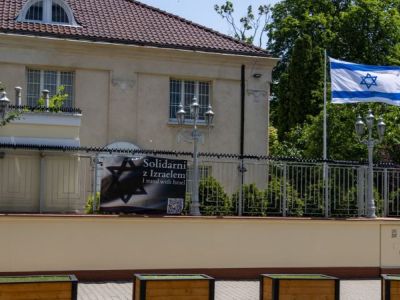Lebanese and Israeli negotiators began the second round of indirect talks to demarcate their maritime border Wednesday, with the Lebanese side adopting a maximalist stance that brings part of an Israeli gas field into disputed territory.
Lebanon's mixed civilian-military delegation, headed by Navy Col. Mazen Basbous, arrived by helicopter and has been directed by the Lebanese Army commander to push for an additional 1,430 square kilometers to be included in Lebanese territory.
This is on top of the already disputed 860 square kilometer area that both sides say is in their respective Exclusive Economic Zone and brings what is now an Israeli gas field into disputed territory.
It also lays claim to Israel's Block 72, which sits off the country's northern shores at the edge of the earlier 860 square kilometer disputed zone.
Israel's Energy Ministry said Wednesday that the talks sought to "assess the possibility of reaching an agreement on demarcating the maritime border ... in a manner enabling the cultivation of natural resources in the area."
Israel in June invited energy companies to bid for exploration rights in Block 72 and was supposed to announce the successful bidder Monday. Production in the now disputed Karish gas field was scheduled to take place imminently, with Greek energy company Energean expecting to draw first gas from it in the second half of 2021.
The planned extraction in Karish and exploration in Block 72 may now have to be put on hold as the negotiations run their course.
The negotiations are being held at the headquarters of the UN Interim Force in Lebanon (UNIFIL) in Naqoura, just north of the UN-demarcated Blue Line separating Israel and Lebanon, who are still formally at war.
"We have a unique opportunity to make substantial progress on contentious issues along" the border, UNIFIL head Major General Stefano Del Col said in a statement Tuesday.
A small group of around d 15 protesters from the Communist Party gathered outside the UN base condemning the talks. Carrying banners displaying the “martyrs” who died resisting Israeli’s occupation of south Lebanon from 1985-2000, they rejected Israel’s participation in talks.
“We are here to say that Palestine is Arab and that if we are delineating anything it should be done with the State of Palestine and not with the Israeli government,” one man said. “Why have we been losing the blood of martyrs so they [Israelis] can come here? Over 40 years of resistance we have evicted them from here and now there’s a little bit of money for grabs we are sitting at a table with them!”
Under the framework, negotiators from each side sit at the same table but do not talk directly to each other. Instead, they address a UN mediator. Career diplomat John Desrocher, now US ambassador to Algeria, is the mediator from the US side, which spent close to a decade bargaining with each side to pave the way for the talks to take place.
The two sides held their first round of talks on Oct. 14 and are expected to hold another round Thursday.
This article has been adapted from its original source.









